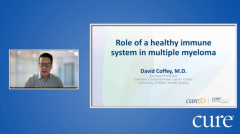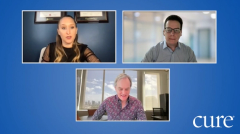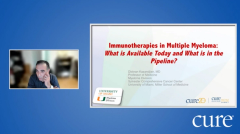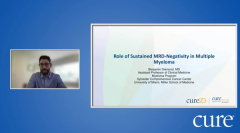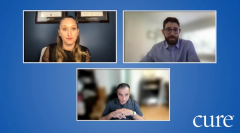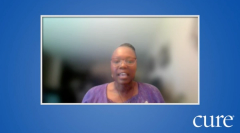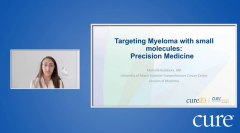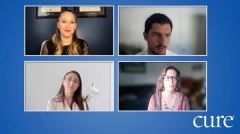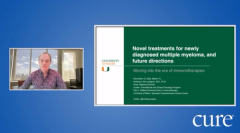
Educated Patient® Multiple Myeloma Summit Immunotherapy Presentation: November 13, 2022
Watch Dr. Dickran Kazandjian, from the Sylvester Comprehensive Cancer Center at the University of Miami, discuss available immunotherapy options during the CURE® Educated Patient® Multiple Myeloma Summit.
Episodes in this series

Compared to cytotoxic chemotherapies, the introduction of immunotherapy has changed the paradigm of treatment for patients with multiple myeloma, according to an expert.
Dr. Dickran Kazandjian, a professor of medicine in the myeloma division at the Sylvester Comprehensive Cancer Center at the University of Miami in Florida, discussed immunotherapy treatment for patients with multiple myeloma further at the CURE® Educated Patient® Multiple Myeloma Summit.
Immunotherapy is a type of therapy that activates a patient’s immune system to “destroy” myeloma cells. A healthy immune system is constantly fighting off infections, bacteria, parasites and potential tumor cells. And one of the reasons cancer forms, Kazandjian explained, is that one’s immune system cannot fight off the evading cancer cells.
“These immunotherapies, the goal is to get the body’s immune system to do what it was not able to do in the first place,” he said in an interview with CURE®.
Immunotherapy is different than typical treatments, such as chemotherapy, because these agents target the actual cancer cell. “We found that immunotherapies are really one of the better ways to treat multiple myeloma,” he noted. “Whereas the more traditional, what we call cytotoxic chemotherapies, actually don’t work that well in general at all in multiple myeloma.”
Kazandjian explained that, because of the impact immunotherapies have had in the treatment space, those cytotoxic chemotherapies are not used as much anymore.
“About a decade and a half ago it was a dismal diagnosis to have multiple myeloma,” he said. “And one of the reasons is because that cytotoxic chemotherapies just didn’t work well. With the introduction of proteasome inhibitors and immunomodulatory drugs (types of immunotherapies) … (it) really changed the natural history, and patients live a lot longer. The whole landscape has changed…”
One type of immunotherapy that has recently made waves in multiple myeloma is chimeric antigen receptor (CAR)-T cell therapy. During this, T cells are taken from a patient and genetically engineered to attack the cancer cells, before being re-administered to the patient. Two CAR-T cell therapies are currently approved for this patient population:
More recently,
And with these immunotherapies comes the gold standard of newly diagnosed multiple myeloma, Kazandjian explained. This includes taking these approved immunotherapies and combining them with novel therapies — which has quickly moved from triplets (a three-drug regimen) to quadruplets (a four-drug regimen).
“The whole paradigm of multiple myeloma is changing with the inclusion of what I like to call novel-novel regimes — so antibodies being added on to already novel combinations that we have,” he said. “There’s a big focus on immunotherapies. And, luckily, our novel therapies in the first place were pretty good. So, it's really going to be a challenge, I think, in the next few years to figure out what the timing and what the combination of these novel therapies along with the immunotherapies are going to be. But I can tell you what's really positive for patients is that pretty much chemotherapy is going to be less and less useful. And I think at some point, probably in the near future, we're not going to see a lot of autologous transplants being done, which really just is high dose chemotherapy with stem cell rescue.”
Although, immunotherapies still do come with their side effects. The most common side effect associated with CAR-T cell therapy and bispecific antibody therapy is cytokine release syndrome (when the immune system responds to immunotherapy more aggressively than it should, which may cause fever, nausea, fatigue and body aches). Additionally, bispecific antibodies can increase a patient’s risk of infections after being on the treatment for a while — which is something that physicians need “a better handle on,” Kazandjian noted.
“I think in the long run, even the worst immunotherapy is not going to be much more difficult — probably not difficult at all — compared to high-dose chemotherapy with stem cell transplant,” he added.
Multiple myeloma is a rare blood cancer, Kazandjian explained, so it is important for patients to stay educated on the updates in treatment so that they are receiving the most effective therapies available.
“If you have myeloma, you really need to be educated, you really need to see a myeloma expert in order to get to full lowdown so to speak on all of these different therapies,” he concluded. “Now, the worst is you don’t want to be treated with an antiquated regimen that has already been surpassed. But to be quite honest with you, I see it all the time from the community.”
For more news on cancer updates, research and education, don’t forget to

